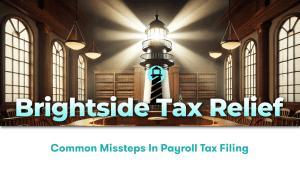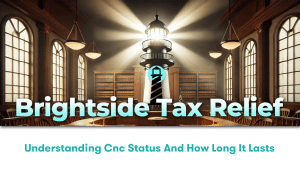Understanding the Trust Fund Recovery Penalty
Being a business owner carries a lot of responsibilities and one of these includes understanding and correctly managing corporate taxes. This includes understanding penalties like the Trust Fund Recovery Penalty (TFRP). Managed by the Internal Revenue Service (IRS), the TFRP is imposed on anyone who is held responsible and willful for not collecting or paying trust fund taxes, thus Brightside Tax Relief LLC believes this is a must-know for every employer.
What is a Trust Fund Recovery Penalty?
A Trust Fund Recovery Penalty is a fine imposed by the IRS on business owners who fail to pay the trust fund taxes they collect from their employees. These include withheld federal income tax, social security, and Medicare taxes. The TFRP ensures that these collected taxes reach the government and are not misused or neglected by employers.
Who Can be Held Liable for the TFRP?
The IRS can hold any person who is responsible for collecting, accounting, and paying these trust fund taxes, and who acted willfully in not doing so, liable for the TFRP. This usually involves a corporate officer or employee of a corporation, a member or employee of a partnership, or any other person with authority and control over funds to direct their disbursement. Even non-business entities, such as nonprofit organizations, can fall under purview of the TFRP.
Characteristics of a Responsible Person
The role of determining who is a ‘responsible person’ lies solely with the IRS. This includes anyone who:
- Is an officer or an employee of a corporation
- Is a member or employee of a partnership
- Has the power to direct and control the disbursement of funds
- Has the authority to sign checks, or
- Can decide which, when, and who among creditors should be paid
Understanding Willfulness in TFRP
‘Willfulness’ in terms of the TFRP means that the responsible person was aware, or could have been aware, of the outstanding taxes and intentionally disregarded the law or was indifferent to its requirements. This includes using available funds to pay other expenses instead of paying the taxes.
The TFRP Assessment Process
The IRS follows a thorough and comprehensive process for TFRP assessment. This includes sending a letter stating the intent to assess the TFRP and providing the taxpayer with opportunities to appeal. The process may also involve an investigation, which includes interviews to determine liability.
How to Avoid the Trust Fund Recovery Penalty?
Prudent management of finances and staying on top of your tax obligations is the best way to avoid the TFRP. This includes timely depositing of payroll taxes, proper management and accounting of funds, and if you’re unable to pay, establishing a payment plan with the IRS.
Challenging a TFRP Assessment
Typically, you have 60 days to appeal a TFRP assessment. If you believe the assessment to be incorrect, you can appeal to the IRS through a written protest or by filling out a request for a Collection Due Process hearing. Remember, obtaining legal advice from tax professionals could also help in challenging a TFRP assessment.
The Consequences of not Paying the TFRP
The penalties for not paying the TFRP can be harsh and include the IRS filing a federal tax lien against your property, executing a levy, or initiating court action to recover the penalty.
To Sum Things Up
The Trust Fund Recovery Penalty is not something business owners or those responsible for handling funds can afford to ignore. A proper understanding of the responsibility it entails and acting accordingly can save from unnecessary financial stress and worry. Remember, when it comes to taxes, ignorance is not bliss.
For more detailed information about the Trust Fund Recovery Penalty, derive value from the IRS’s official explanation.
Moving Forward with Brightside Tax Relief LLC
At Brightside Tax Relief LLC, our priority is to ensure business owners are well-informed about their tax responsibilities, including TFRP. We offer comprehensive tax-related consultation services to help businesses navigate complicated tax landscapes. Understanding the TFRP and its potential consequences is a crucial part of responsible financial management for all employers.




